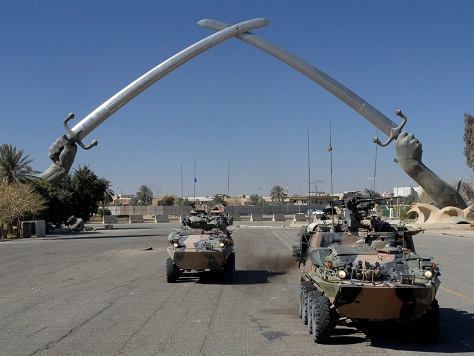
British Foreign Secretary William Hague has confirmed that UK troops will not return to Iraq, despite the recent military gains made by Sunni insurgents. According to the Daily Express Hague said there was “no question” of sending in British combat troops.
Hague’s comments come after a disastrous week for the Western backed Iraqi government. On Tuesday Iraq’s second city Mosul fell to Al-Qaeda linked insurgents from the ‘Islamic State of Iraq and the Levant’ (ISIS). Then on Wednesday Saddam Hussein’s home town of Tikrit also fell.
Reports say that 500,000 people have fled from Mosul, which represents almost its entire population. There have also been mass beheadings of those opposed to rule by the fundamentalists.
But despite calls for international assistance from the Iraqi Foreign Minister Nouri Al-Maliki, including a request for air strikes Hague was adamant he would not commit British troops. He said: “We left Iraq in the hands of elected Iraqi leaders with armed forces, with their own security forces, so it’s primarily for them to deal with.
“We’ll do everything we can to relieve humanitarian suffering and resolve the long-running crisis in Syria.”
An ISIS spokesman was reported as saying the group had some scores to settle with the Shiite led administration in Baghdad. Abu Mohammed al-Adnani, is also believed to have claimed that ISIS planned to launch major offensives against the southern cities of Karbala and Najaf: home to two of the holiest shrines for Shiite Muslims.
Hague’s lack of enthusiasm for a military intervention was echoed in Washington DC. Whilst a US official made clear that Iraq had asked for air strikes against ISIS the Obama administration is understood to favour strengthening the Iraqi military with training and equipment.
“While the national security team always looks at a range of options, the current focus of our discussions with the government of Iraq and our policy considerations is to build the capacity of the Iraqis to successfully confront and deal with the threat posed by ISIS,” said national security council spokeswoman Bernadette Meehan.
In further bad news for the Baghdad government Kurdish forces claimed to have taken full control of the northern oil city of Kirkuk. Kurdish spokesman Jabbar Yawar said: “The whole of Kirkuk has fallen into the hands of peshmerga. No Iraq army remains in Kirkuk now.”
The Kurdish invasion of Kirkuk is widely seen as a defensive move to create a buffer zone between their traditional homeland and what may soon become an ISIS run Islamic Caliphate.
If Iraq does break up the Western world will have to deal with multiple problems. The Caliphate is likely to be a strong supporter of anti-Western terrorism, perhaps even surpassing the contribution to Islamic terrorism made by the Taliban in Afghanistan before the American invasion.
Also a fully independent Kurdistan is likely to use it position to attempt to annex the parts of Kurdistan located in Turkey. This would lead to conflict between two groups that have traditionally supported America in both the Cold War and its conflict with Saddam Hussein.
The breakup would also lead to mass bloodshed as ethnic and religious groups turn against each other. Iraq was created by British in 1921 and gained independence from the United Kingdom in 1932.

COMMENTS
Please let us know if you're having issues with commenting.